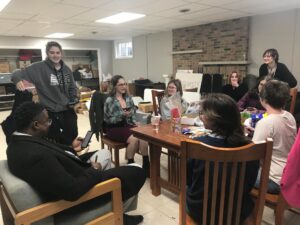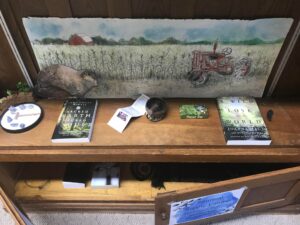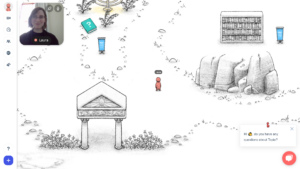Resources
Spiritual Life E-Newsletter “The Sacred Squirrel” and Social Media
Get updates every other week on spiritual life events, religious holidays, resources, and job opportunities by subscribing to “The Sacred Squirrel.”
You can also follow @albioncollegespirituallife on Instagram for more frequent updates and meditations.

Subscribe to our e-newsletter!
Albion College Spiritual Life Guidebook — Communities and Education
Since 2003, the Assistant Director for Spiritual Wellness — Office of Integrated Wellness (OIW) and Office of Belonging — has offered the Albion College community a comprehensive directory of area religious, spiritual, and philosophical communities. Some of these communities offer mentorship opportunities.
View the 2024-2025 faith community directory.
The Assistant Director for Spiritual Wellness maintains strong relations with most religious, spiritual, and philosophical communities in the area region. These include Baha’i, Buddhist, Christian, Hindu, Islamic, Jewish, Pagan, Jain, Native American, Pagan, Quaker, Sikh, and Unitarian-Universalist groups, as well as ‘spiritual but not religious’ and non-religious philosophical communities, which are all featured in the directory.
Spiritual Care Conversations
The Assistant Director for Spiritual Wellness is here to listen, reflect, ask helpful questions, and recommend resources and practices. Students are welcome to make an appointment to have a spiritual care conversation or stop by during weekly office hours, which are advertised regularly in the Albion Today newsletter and on Instagram (@albioncollegespirituallife). She can also help direct you to other local religious and spiritual mentors.
Common topics of discussion:
- Grief and navigating loss and change (including changing beliefs)
- Making decisions
- Theological and spiritual ideas, questions, and concerns
- Questions of meaning and purpose
- Identity exploration
Email ltodd@albion.edu to set up a conversation appointment.
Please note that the Assistant Director for Spiritual Wellness is a mandatory reporter, meaning they must report to relevant campus contacts disclosures of abuse or sexual misconduct.
Learn more about reporting and Title IX
Interfaith Ambassadors Program
The Interfaith Ambassadors are students who work directly with the Assistant Director for Spiritual Wellness to promote belonging for people of all faiths. Last semester’s cohort projects have focused on educating the community about minoritized religious traditions, workshopping policies, and facilitating interfaith dialogue. Interfaith Ambassadors also have the opportunity to earn the Interfaith Leadership innovation badge through reflections on their experiential learning.
Email ltodd@albion.edu for more information.

Interfaith Ambassadors and Hillel Purim Event
Climate Change and Eco-Spirituality Resources
Email the assistant director for spiritual wellness at ltodd@albion.edu to learn about nature-based programming and receive resources related to climate change and the connection between nature and spirituality. These resources include guides to spiritual practices for resilience in the face of climate change, simple rituals for connecting with nature, and opportunities for one-on-one counseling.
The Whitehouse Nature Center hall cabinet contains several resources, including books about the connection between nature and religion, links to guided meditations and nature practices to try, and supplies for meditation and reflection.

Whitehouse Nature Center Spiritual Supply Cabinet
“The Spiritual Playground” Interactive Virtual World and Other Resources for Spiritual Exploration
The assistant director for spiritual wellness has created an innovative way to explore religions and spiritual life with an interactive virtual world called The Spiritual Playground in Topia. Students can stroll the playground individually or with others, and areas can be customized based on students’ questions and needs. Spiritual life also cultivates a robust spiritual life library.
Email ltodd@albion.edu for more information.

Topia World Entrance
Candle and Incense Policy for Boyd Meditation Chapel
Boyd Meditation Chapel is an open space for people who practice all faiths and spiritualities.
Lighting candles is a time-honored and meaningful part of many religious and spiritual practices.
The assistant director for spiritual wellness supports students’ ability to practice in Boyd as they choose, provided that they take care not to damage the space or put others in danger. Boyd is equipped with a smoke detector and an ABC fire extinguisher, located to the right side of the door as you are walking out. A placard is above the extinguisher to help you locate it.
Candle and incense privileges will be approved on a case-by-case basis. Students who wish to light candles or use incense in Boyd Meditation Chapel must take specific precautions to mitigate the risk of fire or other damage (safety guidelines are also posted in Boyd).
Please read the policy, fill out the risk mitigation form, and return it to the assistant director for spiritual wellness. It will be reviewed and kept on file with the spiritual life office and campus safety. You can get a hard copy of the policy outside Boyd Chapel.
Boyd Meditation Chapel Candle Use Policy
Resources for Identifying Mind-Control Groups and Cults
Tufts University chaplaincy has created a basic set of guidelines for recognizing and avoiding cults and mind-control groups.
The International Cultic Studies Association (ICSA) maintains resources on a variety of related topics for former members, families, religious leaders, and other interested parties.
If you are concerned that a religious or philosophical group on Albion’s campus may be a mind-control group or need help leaving one, contact the assistant director for spiritual wellness.
Multifaith Calendar
This multifaith calendar from Harvard Divinity School is a non-exhaustive but detailed calendar of religious observances throughout the year. Viewers can filter results by date and faith tradition.
Bias Reporting System
In line with our commitment to fostering a culture of belonging on campus, we have created a bias reporting system for use by all members of our community. This tool is a resource to report individual incidents of bias on or off campus and serves as a mechanism to help us address systemic issues of bias more broadly.
Learn more about the bias reporting system and find the bias report form